In Part 1 of this series, I shared a little of my personal story and discussed the importance of processing, at a deep emotional level, the reality that we are not alone. Others who have gone before us have experienced similar struggles, pain, sorrow, horror, grief, and unanswered questions.
In Part 2, we discussed what it means to be God’s image bearers in a fallen world filled with darkness.
In this post, we will discuss how Jesus understands and shares our suffering.
The Suffering of Christ:
The truths shared in the two prior posts are truly wonderful! Yet, they can still, at times, come across as a bit sterile and cliché.
Yes, it is great knowing God is good… that He loves me… that He never leaves me. From a philosophical perspective, we can discuss and debate how His goodness combined with His omnipotence still fail to restrain evil and suffering. We can understand God’s sacred respect for human free will and the consequences of living in a fallen world. We can understand that somehow God uses all of the experiential garbage of living in this fallen world to bring about His will and purpose in our lives. We can understand how brokenness is a necessary part of effectively ministering to people in broken circumstances.
Yet, when burdens weigh the heaviest… when our desperate prayers for mercy, justice and relief seem to go unheeded… when evil seems to prosper unchecked… when our anguished souls cry out to God in grief… it can still feel insufficient. A God who allows His children to suffer deep loss and horrible travesties while promising to work it all out for good in some manner only He understands at some future date only He knows, with no promise of relief in the here and now, can seem cold and distant… maybe even cruel.
Sure, God sees the big picture and sees His plan unfolding across the millennia, but that seems poor comfort for us mere mortals suffering in the here and now of this fallen world.
How can God sit back and watch His children suffer while doling out platitudes and proverbs? If God is such a good and faithful friend, why does He allow us to suffer so?
No matter how we rationalize the reasons… no matter how we explain the biblical context… in that moment of deepest sorrow and darkest evil it still feels inadequate. Although we intellectually concede our assent, our raw emotions still cry out this question.
If God is such a good and faithful friend, why does He allow us to hurt so deeply for so long?
I have no answer sufficient for this question. Yes, I have all the previously discussed answers for the intellect. Yet, I have no answer sufficient for the raw emotional suffering.
But we do have Jesus!
We have the account of Jesus praying in the garden where he sweated great drops of blood. He have the anguished cry of Christ pleading, “Father, if it be possible, let this cup pass from me!”
How did the Father respond to the cry of His beloved only begotten son?
He sent angels to minister to Jesus… then sent Jesus to be stripped, whipped, and nailed to a cross to die.

Jesus understands our suffering. Jesus knows what it means to cry out to God for relief and still be left to suffer the deprivations of evil.
Our God has not stood off at a distance objectively watching our suffering while offering empty platitudes of how it is for our own good. Our God has chosen to join us in our suffering. He has chosen to suffer with us. He has chosen to experience the full range of human life in a fallen world.
The author of Hebrews tells us Jesus was made perfect through suffering.
Think about that for a moment. Our good and perfect God, creator of heaven and earth, was made perfect through suffering. How can that be? How can God, who was already perfect, be perfected?
Jesus was already the perfect God. Through suffering, Jesus became our perfect Savior and our perfect Advocate.
For we do not have a high priest who cannot sympathize with our weaknesses, but One who has been tempted in all things as we are, yet without sin. Therefore let us draw near with confidence to the throne of grace, so that we may receive mercy and find grace to help in time of need. (Hebrews 4:15-16)
Jesus knows. Jesus understands. Jesus has suffered as we suffer.
I may not understand God’s plan, but God does understand my suffering.
Jesus understands my suffering… has experienced it Himself… grieves with me in my loss and bewilderment. Knowing this, I can trust God’s plan.
This is not the plan of an emotionally distant God with little concern for the pain experienced by mortals. No, this is the plan of a God who is so deeply personal that He became a mortal Himself, suffered with us and for us, and has sent His Holy Spirit to lead, guide, and comfort us.
Jesus knows God’s plan and Jesus knows our suffering.
Jesus knows!
This is the third part in a series on the topic “When Evil Prospers.” Please join the next post in which I will discuss Lessons from Job.


 What an astonishing sign!
What an astonishing sign!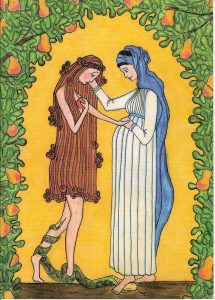 In scripture, the seed is pictured as coming from the man, while the woman’s womb is pictured as a fertile environment for the seed to develop into a child. Yet here God speaks of the woman’s seed. From the very beginning, God had already planned for Messiah to be conceived without an earthly father…to be born of a virgin. Jesus is the seed of the woman.
In scripture, the seed is pictured as coming from the man, while the woman’s womb is pictured as a fertile environment for the seed to develop into a child. Yet here God speaks of the woman’s seed. From the very beginning, God had already planned for Messiah to be conceived without an earthly father…to be born of a virgin. Jesus is the seed of the woman.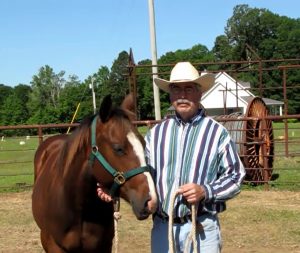
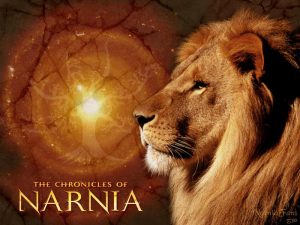 In rereading C.S. Lewis’ The Chronicles of Narnia, I’ve been fascinated by Lewis’ portrayal of how Aslan’s will is worked out in Narnia.
In rereading C.S. Lewis’ The Chronicles of Narnia, I’ve been fascinated by Lewis’ portrayal of how Aslan’s will is worked out in Narnia.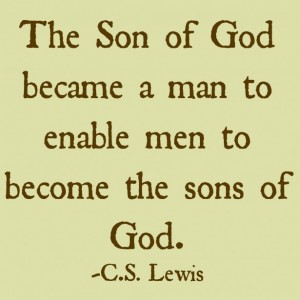 Does God change?
Does God change?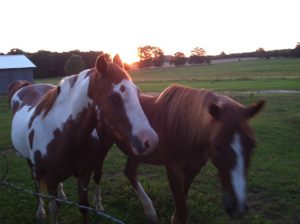 I absolutely love spending time with our horses learning horsemanship!
I absolutely love spending time with our horses learning horsemanship!